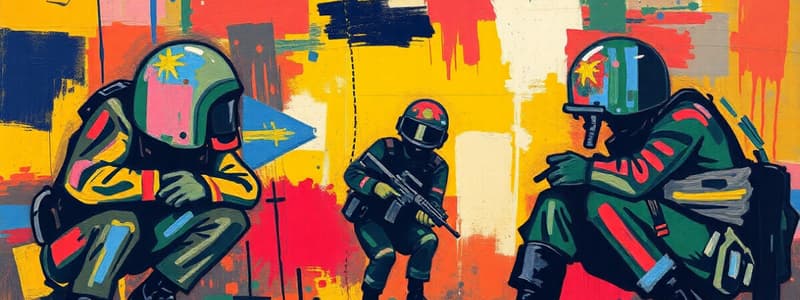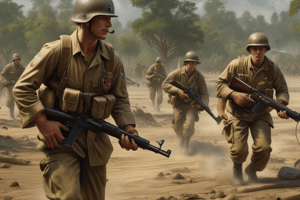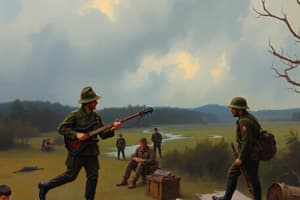Podcast
Questions and Answers
What primary theme is highlighted in Chapter 11 regarding the soldiers?
What primary theme is highlighted in Chapter 11 regarding the soldiers?
- The joy of camaraderie among soldiers
- The glory associated with battle victories
- The significance of shared emotional burdens (correct)
- The strategic importance of supplies in war
How does Chapter 12 illustrate the psychological impact of war on soldiers?
How does Chapter 12 illustrate the psychological impact of war on soldiers?
- By focusing on their relationships with officers
- By detailing their plans for after the war
- By discussing their experiences of loss and resilience (correct)
- By showing their increased physical strength
What is the main focus of Chapter 13 regarding the soldiers?
What is the main focus of Chapter 13 regarding the soldiers?
- Their achievements in battles
- The political motivations behind the war
- Their tactical knowledge in combat
- The significance of shared experiences (correct)
In Chapter 14, how do the soldiers cope with the concept of death?
In Chapter 14, how do the soldiers cope with the concept of death?
What contrasts are presented in Chapter 15 concerning soldiers' interactions with civilians?
What contrasts are presented in Chapter 15 concerning soldiers' interactions with civilians?
What aspect of life in the war zone is depicted in Chapter 16?
What aspect of life in the war zone is depicted in Chapter 16?
Which chapter emphasizes the dehumanizing effects of war on soldiers?
Which chapter emphasizes the dehumanizing effects of war on soldiers?
What recurring theme is evident throughout Chapters 11 to 16?
What recurring theme is evident throughout Chapters 11 to 16?
Flashcards
Chapter 11 Focus
Chapter 11 Focus
Chapter 11 highlights the emotional and physical burdens of war on soldiers, emphasizing their shared vulnerability and bonds.
Chapter 12's Theme
Chapter 12's Theme
Chapter 12 explores the profound impact of loss on soldiers' psychological well-being, showcasing the emotional toll of war.
Chapter 13's Structure
Chapter 13's Structure
Chapter 13 presents individual soldier perspectives, showcasing their unique experiences within the larger war context.
Chapter 14's Core
Chapter 14's Core
Signup and view all the flashcards
Compassion in War (Chapter 15)
Compassion in War (Chapter 15)
Signup and view all the flashcards
Chapter 16's Subject
Chapter 16's Subject
Signup and view all the flashcards
War's psychological toll
War's psychological toll
Signup and view all the flashcards
Individual experiences in war
Individual experiences in war
Signup and view all the flashcards
Study Notes
Chapter 11
- The chapter opens with the soldiers reflecting on the previous night's events, particularly the close calls and near experiences with death.
- It emphasizes the weight of the physical burdens — not just ammunition and supplies, but the emotional and psychological baggage — carried by the soldiers.
- The soldiers' shared vulnerability and bond are highlighted through their interactions and mutual support.
- The chapter touches on the soldiers' internal struggles and their questioning of the war's purpose and meaning.
Chapter 12
- This chapter centers around the soldiers' experiences of loss and the profound impact it has on their psychological well-being.
- It further emphasizes the emotional toll of war and how it tests the soldiers' resilience and compassion.
- The chapter underscores the hypocrisy of war and the dehumanizing effect it has on those involved.
- It showcases the unpredictable nature of combat and how lives can be lost in an instant.
Chapter 13
- The narrative presents a series of interconnected vignettes of individual soldiers, displaying their thoughts and feelings about the war.
- This chapter delves deeper into the individual perspectives of the soldiers, highlighting their unique experiences within the broader war context.
- It underscores the concept of shared experiences and how individual perspectives can add up to create a holistic understanding of the war.
Chapter 14
- The chapter explores the soldiers' encounters with death and the lasting impact it has on their lives.
- It focuses on the soldiers' struggles to cope with witnessing death and destruction.
- The chapter brings up the recurring theme of acceptance and the process of living with grief and loss.
- It underscores the complexities of human behavior under immense pressure during war.
Chapter 15
- This chapter describes the soldiers' interactions with civilians and their attempts to maintain a sense of humanity during the conflict.
- It details acts of kindness and showing empathy towards civilians, despite their own hardships.
- The chapter highlights the contrast between the brutal realities of war and the inherent human capacity for compassion even while fighting.
- It also showcases the soldiers' struggle to reconcile their actions with their values.
Chapter 16
- The chapter portrays the soldiers' experiences with boredom and the monotony of life in the war zone.
- The chapter emphasizes the psychological toll of long periods of inaction and anticipation.
- It underscores how even seemingly inactive periods can be emotionally and mentally taxing.
- The chapter suggests that waiting and anticipation can take a heavy emotional toll on soldiers.
Chapter 17
- The chapter's focus is the aftermath of a battle and the soldiers' reactions to the carnage and loss.
- It shows how the aftermath of conflict can reveal its true cost and impact on those who are directly involved.
- The chapter details the soldiers' experiences of physical and emotional exhaustion.
- The chapter emphasizes the deep-seated psychological and emotional trauma and exhaustion experienced by the soldiers after combat.
Studying That Suits You
Use AI to generate personalized quizzes and flashcards to suit your learning preferences.




